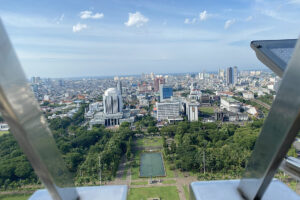Return-to-office orders could lead to stampede of top talent in Philippines

Many workers who were used to remote work arrangements during the pandemic are balking at return-to-office orders. — MATHIEU THOMASSET /HANS LUCAS VIA REUTERS CONNECT
By Revin Mikhael D. Ochave, Reporter
JOHN GABRIEL GALANG-PILAPIL, 22, finally returned to his office on March 6 after working from home for the past two years amid a coronavirus pandemic.
Now, he’s considering quitting his job, noting that he has to endure heavy traffic again on his way to work.
“The transition to working back on-site was really hard,” the working student said in a Facebook Messenger chat. “I’ve been used to working alone in a quiet space at my house. Now, I easily lose focus because of the noise from my colleagues.”
The drive to get people back into offices is clashing with employees who have embraced remote work as the new normal. Some have quit their jobs after their bosses required them to go back to the office.
While companies from Google to Ford Motor Co. and Citigroup, Inc. have promised greater flexibility, many other companies have praised the importance of being inside offices.
There are companies that say remote work diminishes collaboration and company culture.
But legions of workers think that if anything, the past two years have proven that much work can be done from anywhere, without the lengthy commutes on crowded trains or buses.
The government has advocated the return of employees, including business process outsourcing (BPO) workers, to on-site work to support economic recovery. People tend to spend more when outside their homes, which effectively sustains other businesses near offices.
The Fiscal Incentives Review Board (FIRB) has rejected a Philippine Economic Zone Authority (PEZA) proposal to extend an order allowing IT-BPO companies to continue their work-from-home arrangements while keeping their tax perks.
Under the order that expired on March 31, registered IT-BPO companies were allowed to adopt work-from-home setups for 90% of their workforce while enjoying tax incentives.
The state board denied PEZA’s proposal, saying the work-from-home arrangement is a “time-bound measure” and that workers should return to the office amid decreasing infections and the improved vaccinate rate.
Nine of 10 employees preferred a hybrid or remote work setup, according to a survey of 8,184 workers by Sprout Solutions in January.
“The sentiments of employees stem from a love of work and the flexibility to work on one’s own terms, but feel that there is a lack of support to make it sustainable in the long term,” Sprout Solutions Chief People and Customer Officer Arlene de Castro said.
A December study by the Institute for Labor Studies (ILS) of the Philippine Labor department showed that only 62 of 275 companies surveyed said more than half of their employees could work remotely.
“The number of employees eligible for work-from-home and telecommuting ranges from 13,676 to 16,852 or 16% to 18% of the total workforce covered in the survey,” it said.
Work-from-home arrangements allow employees to have work-life balance and flexibility, Rene E. Ofreneo, a professor emeritus at the UP School of Labor and Industrial Relations, said by telephone.
“Work-life balance is very important,” he said. “The traffic already returned and is again a problem for workers. It also affects productivity.”
‘IRONIC’One ace that employees have is a two-year track record of working remotely without a drop in productivity; many have even reported the opposite.
Working from home let them cut out the commute, be their best both at home and at work, have more time for their children and cut concerns about coronavirus exposure.
The government should consult workers instead of forcing them to go to the office, Mr. Ofreneo said. “The PEZA, Department of Trade and Industry and Department of Finance together with the workers should find the correct approach.”
“It’s ironic,” the labor expert said. “They have been talking about global competitiveness. Part of being globally competitive is that you are very flexible and agile. Working from home is part of the adjustments to the global challenges of staying in business and being competitive.”
Sergio R. Ortiz-Luis, Jr., president of the Employers Confederation of the Philippines, said the government should improve mass transportation to help employees returning to the office.
“We need to improve mass transportation and improve the traffic situation.”
He also said the decision to allow remote work is a company prerogative, adding that some industries could benefit from it.
“It is the decision of the company,” he said. “If the company is fine with on-site work, they can do that. While some employees would like to work from home, they are not the ones paying the salaries. It’s the company.”
Mr. Ofreneo said the government should support remote work setups.
“Not only will working from home stay, it’s about to expand because of how advanced the world is now,” he said. “As long as we have good internet connection, the business system and work arrangements will continue to evolve.”
Mr. Pilapil, the call center agent, said he needs to be able to work from home so he could continue studying.
“Otherwise, I will struggle balancing my time and budget,” he said. “Now, I’m too tired to study after commuting from work.”




